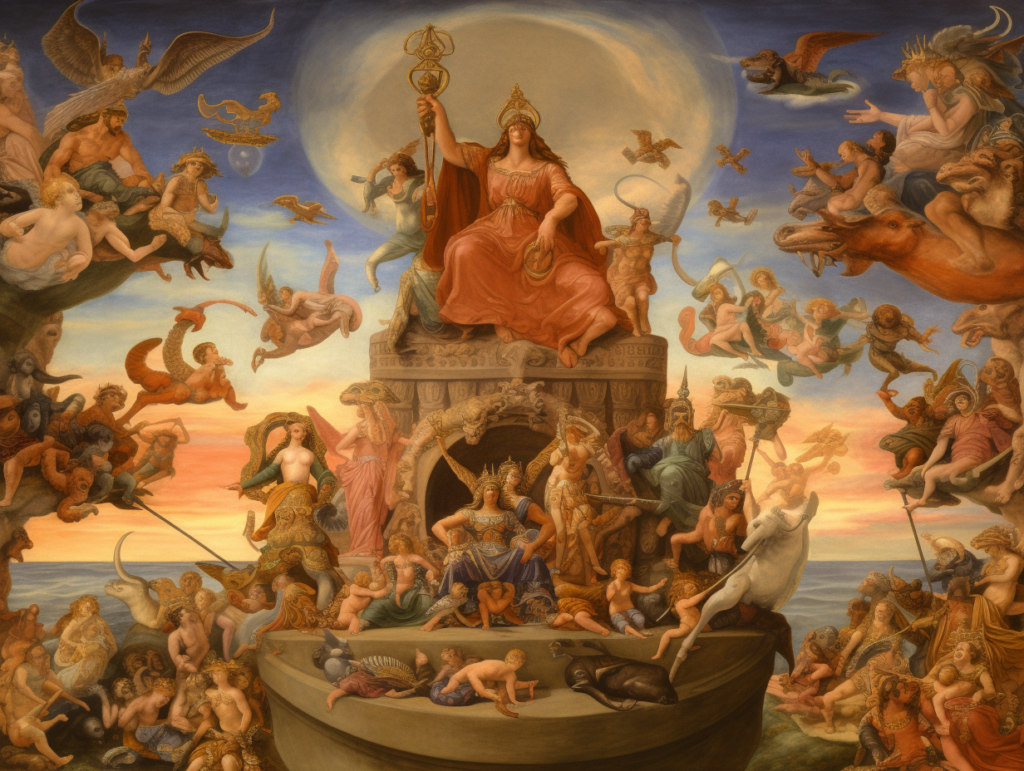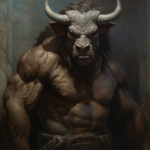Are you fascinated by the divine gods and goddesses in the epic poem, the Iliad?
Discover the powerful deities who shape the fate of warriors and heroes in this ancient Greek tale.
From Zeus, the ruler of the gods, to Athena, the goddess of strategy and warfare, each deity brings their unique abilities and personalities to the battlefield.
Join us on a journey through the mythological world of the Iliad and uncover the intrigue and power of these divine beings.
Key Takeaways
- Zeus plays a central role in the Iliad, exerting influence and shaping events through divine interventions.
- Athena is a crucial figure in guiding the outcome of battles, providing strategic advice and actively supporting favored warriors.
- Apollo possesses unparalleled expertise in archery and his arrows bring both plague and healing, frequently being called upon to heal wounded warriors on the battlefield.
- Aphrodite’s ability to manipulate desire and create chaos in relationships shapes the course of events in the Iliad, acting as a driving force behind characters’ actions and motivations.
The Role of Zeus in the Iliad
You’ll find Zeus exerting his influence and shaping the events of the Iliad through his divine interventions. As the king of the gods, Zeus holds immense power and authority. He plays a critical role in the epic, often deciding the fate of mortals and manipulating the course of the Trojan War. Zeus’s influence on mortal decisions is evident throughout the story, as he uses his power to sway the outcome of battles and the destiny of heroes.
Zeus’s role in the Iliad is multifaceted. He’s not only the most powerful god but also the arbiter of justice and the protector of the divine order. He ensures that mortals face the consequences of their actions, and he punishes those who defy his will. However, Zeus isn’t impartial. He favors certain mortals, such as the Trojan prince Hector, whom he grants strength and courage. Conversely, he often impedes the progress of the Greeks, who are his enemies.
Zeus’s influence on mortal decisions isn’t limited to warfare. He also influences the emotions and desires of the characters, manipulating their thoughts and actions. For example, he sends a false dream to Agamemnon, urging him to attack the Trojans. This leads to a series of events that ultimately shapes the outcome of the war.
Athena: The Goddess of Strategy and Warfare
When it comes to battles, Athena is a force to be reckoned with. As the goddess of strategy and warfare, she plays a crucial role in guiding the outcome of conflicts.
Not only does Athena provide strategic advice to mortals on the battlefield, but she also forms close relationships with them, showing her dedication to their success.
Athena’s Role in Battles
Athena is the goddess who excels not only in strategy and warfare but also in providing guidance and assistance to warriors on the battlefield. Her military tactics are legendary, and her role in the Trojan War was instrumental in the Greeks’ victory.
Here are some key aspects of Athena’s role in battles:
- Tactical Brilliance: Athena’s strategic mind allows her to devise clever plans and outmaneuver her enemies. She’s known for her innovative and effective military tactics.
- Protection and Support: Athena actively supports and protects the warriors she favors, granting them strength, courage, and wisdom during battle.
- Inspiration: Athena inspires warriors to fight with valor and determination. Her presence on the battlefield instills confidence and boosts morale among the troops.
- Divine Intervention: Athena intervenes in battles to tip the scales in favor of her chosen side, ensuring victory for the warriors she supports.
With her expertise and divine assistance, Athena’s role in battles is crucial for achieving triumph.
Now let’s delve into Athena’s strategic advice.
Athena’s Strategic Advice
To fully understand Athena’s strategic advice in the Iliad, it’s important to recognize her role as the goddess of strategy and warfare.
Athena’s wisdom and influence play a crucial role in the epic poem, as she guides and advises the mortal warriors in their battles. With her strategic mind and tactical expertise, Athena offers invaluable advice to the heroes, helping them navigate the complexities of the battlefield.
She empowers them with her wisdom and inspires them to make strategic decisions that can turn the tide of the war. Athena’s influence is evident in the actions of the warriors, as they trust her expertise and follow her guidance.
Athena’s Relationship With Mortals
You can observe Athena’s close and influential relationship with mortal warriors throughout the Iliad. As the Goddess of Strategy and Warfare, Athena plays a pivotal role in guiding and empowering these mortal heroes on the battlefield. Here are some key points to highlight her relationship with mortals:
- Athena’s influence on mortal heroes:
Athena actively intervenes in battles, providing strategic advice and empowering mortals with her divine wisdom. She often appears disguised as mortal warriors, guiding them to victory and ensuring their success.
- Athena’s relationship with Odysseus:
Athena has a special bond with Odysseus, the cunning hero of the Trojan War. She offers him guidance and protection, helping him navigate the challenges he faces on his journey back home to Ithaca.
Athena’s close connection with mortal warriors, especially her relationship with Odysseus, demonstrates her dedication to freedom and her desire to ensure the triumph of those who fight for it.
Apollo: The Divine Archer and Healer
As you read about Apollo in the Iliad, you’ll discover his remarkable skills as a divine archer and healer.
Apollo, the son of Zeus and Leto, is known for his unparalleled expertise in archery and his ability to deliver swift and deadly arrows. His divine archery skills are unmatched, and he can strike down his enemies with precision and accuracy. Apollo’s arrows are said to bring both plague and healing, as he possesses the power to inflict illness or cure it.
His healing abilities are renowned, and he’s often sought after by both mortals and gods for his assistance in curing diseases and wounds. Apollo’s role as the divine healer is significant in the Iliad, as he’s frequently called upon to heal wounded warriors on the battlefield.
From his divine archery to his exceptional healing powers, Apollo showcases his immense strength and versatility.
As we delve into the next section about Aphrodite, the goddess of love and beauty, we’ll explore another fascinating deity in the Iliad.
Aphrodite: The Goddess of Love and Beauty
Delve into the enchanting world of Aphrodite, the goddess of love and beauty, and uncover her captivating influence in the Iliad. As you explore Aphrodite’s impact on human relationships, you’ll be amazed at the power she wields over mortals and immortals alike.
Here are some key aspects of Aphrodite’s influence:
- *Manipulating Desire*: Aphrodite possesses the ability to manipulate desire, causing mortals and gods to fall passionately in love or experience intense lust. Her actions often lead to conflicts and tragic consequences, as seen in the ill-fated love affair between Helen and Paris.
- *Meddling in Relationships*: Aphrodite frequently intervenes in mortal affairs, interfering with human relationships and creating chaos. Whether it’s causing infidelity or igniting forbidden romances, she disrupts the natural order of things and challenges societal norms.
- *Inspiring Beauty*: Aphrodite’s divine beauty radiates throughout the Iliad, captivating all who behold her. Mortals and gods alike are drawn to her irresistible allure, and her presence evokes feelings of desire, jealousy, and admiration.
- *Driving Motivation*: Aphrodite’s influence extends beyond love and beauty. She often acts as a driving force behind characters’ actions, encouraging them to pursue their desires, make sacrifices, and engage in heroic deeds.
Aphrodite’s impact on human relationships is profound, shaping the course of events in the Iliad and illustrating the complex and sometimes destructive nature of love and desire.
Poseidon: The God of the Sea and Earthquakes
Diving into the depths of Poseidon’s domain, the God of the Sea and Earthquakes, you’ll discover the immense power he holds over the natural forces and the lives of mortals. Poseidon, with his flowing blue hair and trident in hand, commands the vast seas and rules over the mighty waves. But his power extends beyond the ocean depths, as he also possesses the ability to cause earthquakes, shaking the very foundations of the earth.
Poseidon’s rivalry with Zeus, the King of the Gods, is well-known throughout Greek mythology. The two brothers often clashed, each vying for dominance over the world. Poseidon’s resentment towards Zeus stems from their competition for power and control. While Zeus ruled the heavens, Poseidon sought to establish his authority over the seas and the earth. This rivalry fueled Poseidon’s desire to assert his influence and assert his dominance.
During the Trojan War, Poseidon played a significant role in shaping the outcome. He supported the Greeks in their battle against the Trojans, using his powers to aid their cause. Poseidon’s involvement in the war showcased his loyalty to the mortal realm and his willingness to intervene in the affairs of humans.
Transitioning into the subsequent section about Hera, the Queen of the Gods and Protector of Marriage, we shift our focus to another powerful deity whose influence reaches far and wide.
Hera: The Queen of the Gods and Protector of Marriage
Hera, as the Queen of the Gods and Protector of Marriage, holds immense power and influence over the sacred union between mortals. Her presence looms large in the realm of gods and mortals, and her actions and decisions shape the course of events in the epic tale of the Trojan War.
Here are some key aspects of Hera’s role and characteristics:
- Rivalry with Aphrodite: Hera’s rivalry with the goddess of love, Aphrodite, is legendary. Both goddesses vie for power and influence, but their contrasting approaches often clash. Hera represents the stability and commitment of marriage, while Aphrodite embodies the passionate and sensual aspects of love. Their rivalry adds depth and complexity to the narrative, highlighting the different facets of love and relationships.
- Protector of Marriage: As the goddess of marriage, Hera plays a crucial role in safeguarding the sanctity of the union. She ensures that the bonds of matrimony are respected and upheld. Hera’s commitment to marriage serves as a reminder of the importance of loyalty, fidelity, and commitment in relationships.
- Involvement in the Trojan War: Hera’s involvement in the Trojan War is significant. She takes an active role in supporting the Greeks, using her powers and influence to aid their cause. Hera’s actions often stem from her desire to protect her favored mortal heroes and ensure their victory in the war.
- Manipulative Tactics: Hera is known for her cunning and manipulation. She uses her wit and guile to further her agenda and bend events to her will. Hera’s strategic maneuvers and schemes contribute to the intricate web of alliances and conflicts that shape the outcome of the Trojan War.
Hera’s complex character and multifaceted role in the Iliad make her a compelling figure, highlighting the intricate dynamics of power, love, and loyalty in ancient Greek society.
Hermes: The Messenger of the Gods and Guide of Souls
You’ll find that Hermes, as the Messenger of the Gods and Guide of Souls, plays a crucial role in the events of the Iliad. Hermes’ role as a psychopomp is to guide the souls of the dead to the Underworld, ensuring their safe passage. His relationships with the other gods are also important, as he acts as a mediator between them and the mortal world. Hermes is known for his cunning and quickness, making him the perfect messenger for the gods.
Symbolism plays a significant role in the Iliad, and Hermes’ caduceus is no exception. The caduceus, a staff with two snakes intertwined around it, represents Hermes as the divine messenger. It’s a symbol of his authority and power to deliver messages between the gods and mortals. In the Iliad, Hermes uses his caduceus to guide souls to the Underworld and to deliver messages from the gods to the mortal heroes on the battlefield.
Hermes’ presence in the Iliad highlights the importance of communication and guidance. As the Messenger of the Gods and Guide of Souls, he ensures that messages are delivered and that souls reach their final destination. His role as a mediator and his symbolism as a messenger make him a key figure in the epic poem, contributing to the overall narrative and the interactions between gods and mortals.







